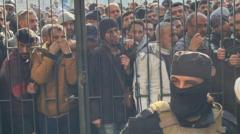The recent shift in control in Syria has led to a stream of soldiers abandoning the Assad regime and seeking refuge in reconciliation centres operated by the rebel group Hayat Tahrir al-Sham (HTS). On a night marked by chaos and retreat, soldier Mohammed el-Nadaf recalls his decision to shed his military uniform amidst a failing command structure, saying, "I took off my uniform, left my weapons, and started to make my way to my village in Tartous."
Similarly, another soldier, Mohammed Ramadan, voiced his disillusionment with the regime, stating, "I thought, why should I die and fight for someone who didn't even give me enough of a salary to be able to feed my family?" This sentiment reflects the plight of many soldiers, who revealed they barely earned $35 a month, insufficient to meet basic living costs.
The reconciliation centre in Damascus—once an office of Assad’s Baath Party—has become a haven for former military personnel, police officers, and militia members looking to dissociate from past affiliations and to obtain civilian identity documents. This process of reintegration is crucial, as many were forced into military service without options for escape due to the confiscation of their civilian IDs.
Waleed Abdrabuh, overseeing the reconciliation efforts, explained, "The goal is to have the weapons issued by the former regime returned to the state and for members to receive civilian IDs." Reports indicate that thousands have shown up at these centres, eager to distance themselves from the regime and the actions taken under Assad's rule.
While the atmosphere at the centres has been relatively amicable, an underlying tension persists due to potential revenge attacks targeting former regime affiliates. Recent incidents, such as the reported killings of three judges in the town of Masyaf, shed light on the complex dynamics at play, raising alarm among the families of the victims, including the wife of Mounzer Hassan, an Alawite judge, who stated, "Everyone says HTS did not commit the crime. But they must find out who did it."
HTS has condemned the violence, emphasizing their intention to maintain order while also promising accountability for those involved in previous crimes. As Syria navigates this critical transition, the relationship between former soldiers, the new governing authorities, and the communities they inhabit remains fraught with uncertainty.
The reconciliation process may represent a glimmer of hope for soldiers wanting to begin anew, but the specter of past allegiances and violent retributions poses challenges that could undermine the fragile peace—all against a backdrop of an intense civil conflict that has reshaped lives for over a decade. The path ahead for Syria's future thus remains delicate, pointing toward a long journey of healing and unity that lies ahead.

















